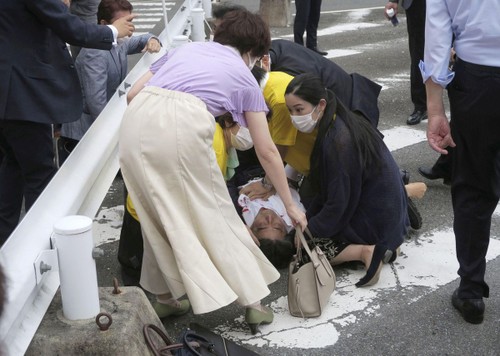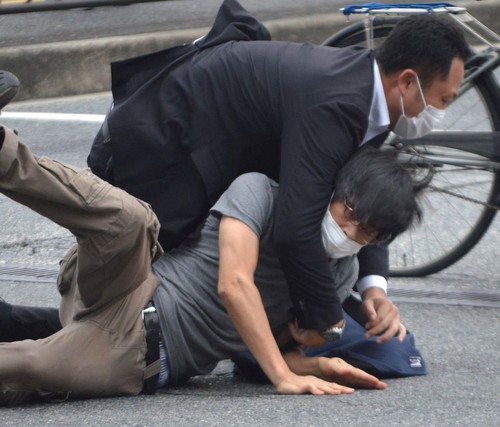 Former Japanese prime minister Shinzo Abe lies on the ground after apparent shooting during an election campaign for the July 10, 2022 Upper House election, in Nara, western Japan July 8, 2022. in this photo taken by Kyodo. (Mandatory credit Kyodo via REUTERS) Former Japanese prime minister Shinzo Abe lies on the ground after apparent shooting during an election campaign for the July 10, 2022 Upper House election, in Nara, western Japan July 8, 2022. in this photo taken by Kyodo. (Mandatory credit Kyodo via REUTERS) |
A man opened fire on Abe, 67, from behind with an apparently homemade gun as he spoke at a drab traffic island in the western city of Nara, Japanese media showed earlier. It was the first assassination of a sitting or former Japanese premier since the 1930s.
Speaking before Abe's death was announced, Prime Minister Fumio Kishida condemned the shooting in the "strongest terms" while Japanese people and world leaders expressed shock at the violence in a country in which political violence is rare and guns are tightly controlled.
Police said a 41-year-old man suspected of carrying out the shooting had been arrested. NHK quoted the suspect, identified as Tetsuya Yamagami, as telling police he was dissatisfied with Abe and wanted to kill him.
 A man, believed to be a suspect shooting Japanese Prime Minister Shinzo Abe is held by police officers at Yamato Saidaiji Station in Nara, Nara Prefecture on July 8, 2022 in this photo taken by the Yomiuri Shimbun. (The Yomiuri Shimbun/KYODO via REUTERS) A man, believed to be a suspect shooting Japanese Prime Minister Shinzo Abe is held by police officers at Yamato Saidaiji Station in Nara, Nara Prefecture on July 8, 2022 in this photo taken by the Yomiuri Shimbun. (The Yomiuri Shimbun/KYODO via REUTERS) |
Abe served two terms as prime minister to become Japan's longest-serving premier before stepping down in 2020 citing ill health.
But he has remained a dominant presence over the ruling Liberal Democratic party (LDP) party, controlling one of its major factions.
Abe has been best known for his signature “Abenomics” policy featured bold monetary easing and fiscal spending.
He also bolstered defence spending after years of declines and expanded the military’s ability to project power abroad.
In a historic shift in 2014, his government reinterpreted the postwar, pacifist constitution to allow troops to fight overseas for the first time since World War Two.
Abe first took office in 2006 as Japan’s youngest prime minister since World War Two.